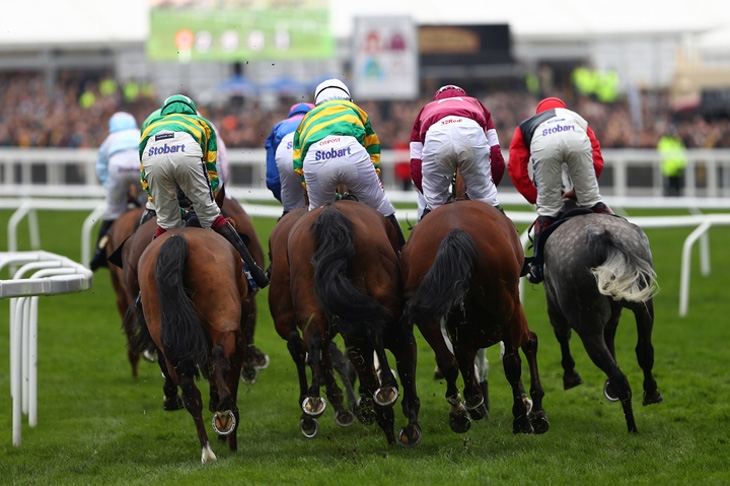Bookmaker Paddy Power once famously declared, ‘Cheltenham is the best craic you can have and if you cannot look forward to it you need to have your doctor check you are still alive.’ This year it seemed that the whole place was in danger of being enveloped in Irish tricolours. Irish-trained horses won 19 races compared with the mere nine taken by horses trained in England.
Willie Mullins, despite drawing a blank on the first two days and seeing the previously unbeaten Douvan vanquished thanks to injury, still trained six but was beaten to the Festival championship by Gordon Elliott with another six victories and more second places. With Sizing John’s Gold Cup victory, plus two more, Jessica Harrington became the most successful female Festival trainer ever. Owners Ann and Alan Potts had taken Sizing John and other horses from Henry de Bromhead in 2016, but at least he had the consolation of winning the Queen Mother Champion Chase with Special Tiara. Ruby Walsh, who gives other riders master classes in winning from the back, winning from the front and collecting victories on the nearly unrideable, was champion Festival jockey yet again. Incidentally, the Irish, despite moaning in advance that English handicapper Philip Smith had stacked the odds against them, also took nearly all the handicap races.
My hero of the week was Ireland’s Jamie Codd: amateur by status, total professional in his riding. He won the tricky cross-country race on Cause of Causes and took the Champion Bumper on Fayonagh despite being almost left at the start. It was Jamie Codd, too, who had insisted at Festival preview evenings that Labaik, the quirky customer who won the Supreme at 25–1 after for once consenting to start, was the most impressive galloper in the Elliott yard.
The Irish challenge at Cheltenham owes much to the deeply competitive Irish point-to-point scene, where amateurs such as Jamie Codd and Derek O’Connor, and before them the late J.T. McNamara, play a vital role. Ted Walsh — rider, trainer, commentator and father of Ruby — explained to me why those ‘Irish amateurs’ are so much in demand for Festival rides. They are not landowners, bankers and army men with a few bob in the bank having a fling. ‘In Ireland, amateur jockeys have been farmers’ sons who rode horses, broke horses and rode in point-to-points. They ride as
amateurs because of their weight. If they were ten stone they would be [professional] jockeys.
‘If Derek O’Connor was ten stone, he’d be Ruby or Barry Geraghty. Same with Jamie. That’s why they are amateurs, not the state they were born to. Financially, they make it work because they are into buying and selling horses. They buy point-to-point horses and they sell them and they make a good living out of riding and knowing them.’ English trainers will telephone them and say, ‘Jamie, if you come across a nice horse give me a call.’ With a bit of commission to oil the wheels, it is a system that works for all concerned. When I suggested that the Irish pros, too, have something special, having been toughened up by competing on the pony-racing circuit, that brought a knowing laugh. Pony-racing in Ireland, said Ted, is far, far removed from the decorous English sight of well-groomed, well-spoken kids on well-groomed ponies. ‘In Ireland, it’s not pony-racing, it’s flapping. Pony-racing is just a nice glossy name. It’s like calling a brothel a massage parlour. The horses are 15.2, 16.0 hands, including ex-racehorses and all that.’ To survive in that world, he agreed, you have to be rough, tough and streetwise.
It was a magical Festival. Lasting memories this year will include the pumped-up exhilaration of Ben Pauling, noted here as a trainer to watch, celebrating his first Festival winner, Willoughby Court. The grace and good manners of Willie Mullins, after his two blank days, will stick, as will his observation on the exuberant Un De Sceaux, who literally jumps for joy, that his job in training him is to teach him not to wear himself out because he gives it his all every day. ‘People expect us to have winners,’ Willie noted. ‘We hope to.’
There was Nico de Boinville’s effort to get Might Bite back in the race, after his mount attempted to throw away the RSA with victory in his sights, and the smiling satisfaction of Nicky Henderson at having made the clever call to haul Buveur D’Air back from a chasing career to become his sixth Champion Hurdle winner. All three races for amateurs were won this year by women riders: Lisa O’Neill in the National Hunt Chase, Gina Andrews in the Fulke Walwyn, Kim Muir and Bryony Frost in the Foxhunters. And for me The Young Master in the Ultima ran an ideal Grand National trial. But, with next year’s Cheltenham in mind, I won’t forget Ruby Walsh’s comment to his dad as we talked after Yorkhill’s victory. His simple summary? ‘Good horse. Could be a Gold Cup winner.’






Comments